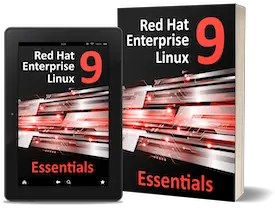- Introduction
- A Brief History of Red Hat Linux
- Installing RHEL 9 on a Clean Disk Drive
- Dual Booting RHEL 9 with Windows
- Allocating Windows Disk Partitions to RHEL 9
- Using the Bash Shell on RHEL 9
- A Guided Tour of the RHEL 9 GNOME 40 Desktop
- Understanding RHEL 9 Packages, Repositories, and AppStreams
- An Overview of the RHEL 9 Cockpit Web Interface
- RHEL 9 Firewall Basics
- RHEL 9 Firewall Configuration with firewalld
- Managing RHEL 9 Users and Groups
- Managing RHEL systemd Units
- RHEL 9 Network Management
- Configuring SSH Key-based Authentication on RHEL 9
- RHEL 9 Remote Desktop Access with VNC
- Displaying RHEL 9 Applications Remotely (X11 Forwarding)
- Using NFS on RHEL 9 to Share Files with Remote Systems
- Configuring Samba on RHEL 9
- An Overview of RHEL 9 Virtualization Techniques
- Installing KVM Virtualization on RHEL 9
- Creating KVM Virtual Machines on RHEL using Cockpit
- Creating KVM Virtual Machines on RHEL 9 using virt-manager
- Creating RHEL 9 KVM Virtual Machines with virt-install and virsh
- Creating a RHEL 9 KVM Networked Bridge Interface
- Managing KVM using the RHEL 9 virsh Command-Line Tool
- An Introduction to RHEL 9 Containers
- Working with Containers on RHEL 9
- Setting Up a RHEL 9 Web Server
- Setting up a RHEL 9 Postfix Email Server
- Adding a New Disk Drive to a RHEL 9 System
- Adding a New Disk to a RHEL 9 Volume Group and Logical Volume
- Adding and Managing RHEL 9 Swap Space
- RHEL 9 System and Process Monitoring
Red Hat Enterprise 9 Linux Essentials
Categories RHEL

